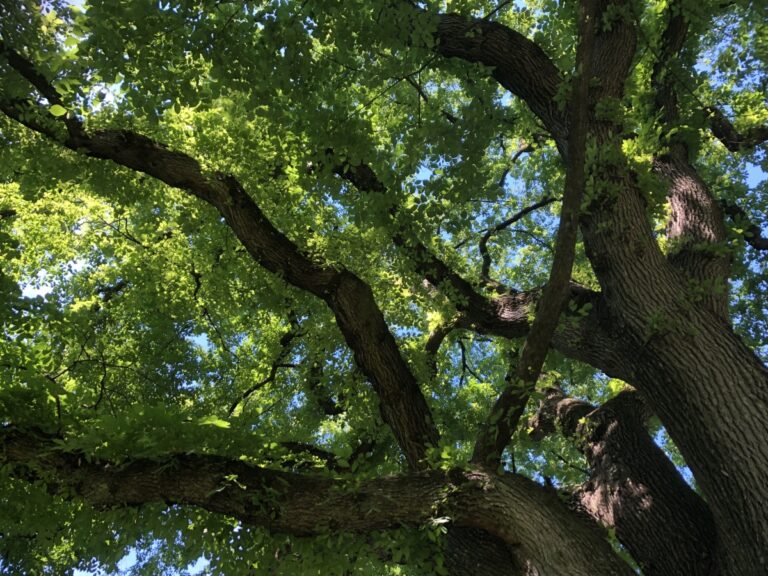Similar Posts

April 2019 Audio Meditation
If you’d like to experience this guided meditation with images, here’s the youtube version: https://youtu.be/bT-DbKga6nc

836th Week: Noticing Where We Put Our Energy
I just saw a little dog standing in an open area of lawn, wildly barking at a squirrel who was up a very tall tree nearby. It made quite a funny picture, with the lawn and the size of the tree making the small dog look even smaller. What it brought to mind was a sense of focused intention and energetic commitment. The squirrel was all that mattered and the little fur-face on the ground was giving it all he was worth.
This got me to thinking about where we put our energy. All the barking in the world wasn’t going to get the squirrel within reach of the dog and I found myself wondering about all the energy we may put into things that aren’t really available to engage with us. With all the gadgets that we now have available to us, and with most of us carrying around a computer in our pocket in our smart phones, there are increasing opportunities to spend time in less conscious and less focused ways. At times, I find myself doing a word game that can take up an unexpected amount of time and I’ve made a commitment to myself that I’ll only do that a couple of times a day. Instead of that activity, I now spend the same time reading on my kindle and I find that it’s much more satisfying, ultimately, than endlessly playing the word game.
Also, at my age, I’m keenly aware of a more limited amount of time in front of me and I have made it a practice to ask myself if what I’m doing honors the fact that I don’t want to waste whatever time I have left to be here. I hope that doesn’t sound morbid because, for me, it’s a powerfully positive motivator and invites me to focus my attention more clearly.
Read More “836th Week: Noticing Where We Put Our Energy”
800th Week: Some Approaches to Ease Stress
Sitting in Central Park on a quiet Sunday morning, I find myself wondering what to offer for this week’s practice. One of the things most of us need at this point are ways to settle ourselves, reliable ways to re-center in the presence of so many adaptations required in this world of both a pandemic and an essential confrontation with racial and economic inequities that have been accepted as normal for far too long.
As I’ve been doing lately, I’d like to offer some practices that might be of help during stressful times. As a collective, we face necessary demands for fundamental social change even as we adapt to learning to manage a pandemic we don’t yet fully understand, and these inescapable realities are sources of stress for most of us.
Drawing from my hypnosis background as well as Somatic Experiencing and EMDR, here are some practices I’ve found useful over the years:
Read More “800th Week: Some Approaches to Ease Stress”Week 655: I Choose Love
As I did my HeartMath practice this morning, I found that I could pretty reliably return to a coherent heart and internal sense of balance (which translates as a “green” response on the Inner Balance app), when I silently repeated the mantra, “I choose love”. Read More “Week 655: I Choose Love”

725th Week: Noticing Relationship and Gratitude
As I write this practice, I’m sitting in Central Park on a Sunday morning, having some quiet time to write, to soak in the sounds of birds, insects, hawks, dogs, and people. It’s a place I come to each weekend morning when weather and schedule permit. What comes to mind this morning is that I bring my iPad so I can write. I bring my container of coffee. I bring the muffin I buy along the way. I carry everything in my backpack, including my phone and earbud connections.
As I think of all these things that are part of my weekend morning routine, I also begin to think about the many people and resources that went into making this moment possible, people I will never know and yet without whom I wouldn’t have all the things with me that I want to bring along on these quiet, meditative morning journeys. Read More “725th Week: Noticing Relationship and Gratitude”

877th Week: Cultivating Kindness As a Habit of Mind
I’ve been reading a lot about social justice lately, as well as the challenges of moving out of the assumptions and institutions of white supremacy. The process has been yet another reminder of the importance and impact of unexamined perceptions and beliefs. I’ve written many times about engaging in acts of kindness and my recent reading has brought to the foreground of awareness the importance of cultivating and orienting to thoughts and self-talk focused on and arising from kindness.
Our habits of mind matter more than we may realize. In a sense, they are a form of ongoing self-hypnosis through which we program ourselves and emit the quality and tone of awareness and being that characterize how we move through the world and how we feel about, and treat, ourselves. The goal of the following practice isn’t to create an internal battle, argument, or conflict when noticing the unkind thoughts and actions that we may do without awareness. Because I have such a deep belief in wholeness, I understand that there will always be things arising in me that I may not enjoy experiencing, but they are part of an unbroken wholeness that is true of everyone.
Many times, I’ve written about the foreground/background dynamic of our wholeness. Sometimes something pops into the foreground of our thinking or behaving that we don’t particularly like, something that arises as one of the habits of mind that comes with years of conditioning. The good news is that anything that pops into the foreground can be invited into the background and replaced by something we would rather experience and/or express. It’s a matter of cultivating the kind of awareness that can compassionately notice when we’ve gone off track and that can then gently call us back to ourselves.
Read More “877th Week: Cultivating Kindness As a Habit of Mind”